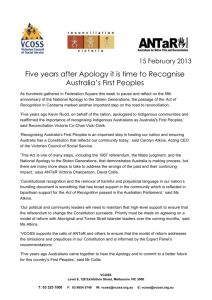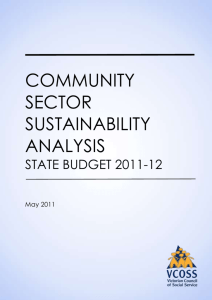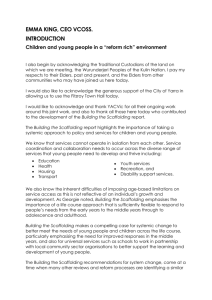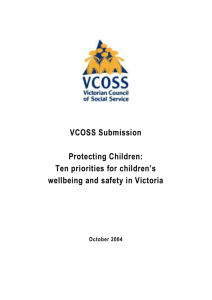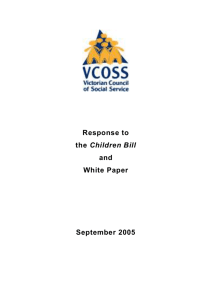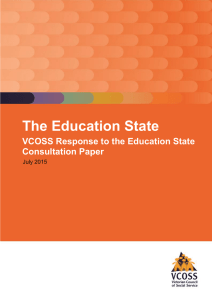Briefing for VCOSS consultation on health and wellbeing
advertisement
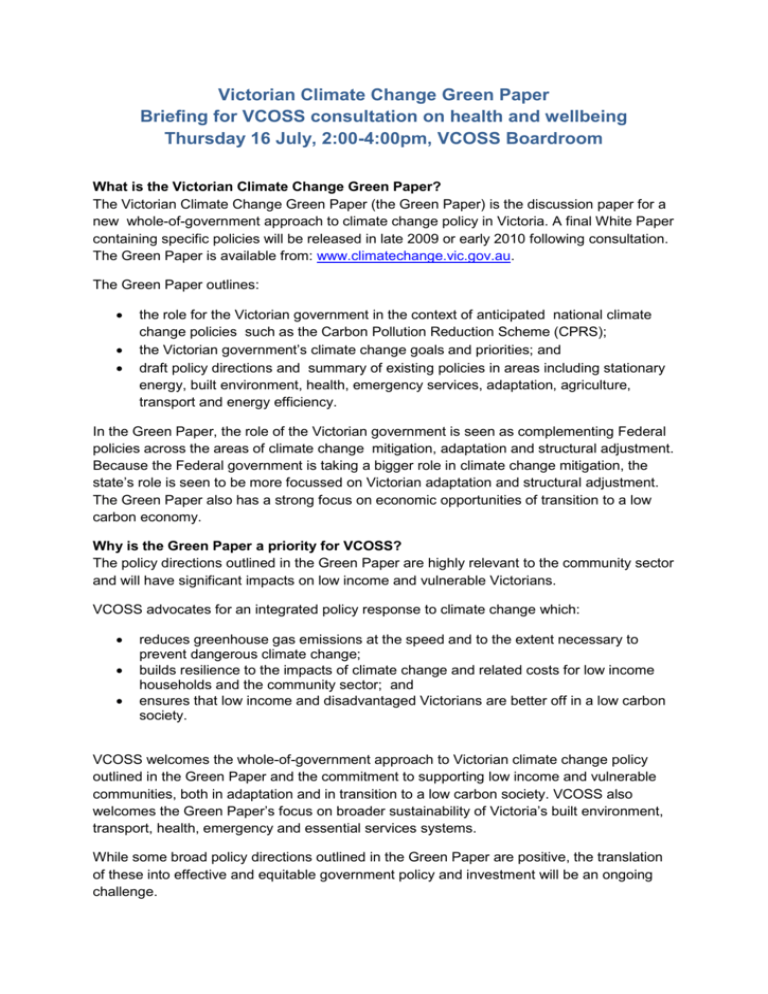
Victorian Climate Change Green Paper Briefing for VCOSS consultation on health and wellbeing Thursday 16 July, 2:00-4:00pm, VCOSS Boardroom What is the Victorian Climate Change Green Paper? The Victorian Climate Change Green Paper (the Green Paper) is the discussion paper for a new whole-of-government approach to climate change policy in Victoria. A final White Paper containing specific policies will be released in late 2009 or early 2010 following consultation. The Green Paper is available from: www.climatechange.vic.gov.au. The Green Paper outlines: the role for the Victorian government in the context of anticipated national climate change policies such as the Carbon Pollution Reduction Scheme (CPRS); the Victorian government’s climate change goals and priorities; and draft policy directions and summary of existing policies in areas including stationary energy, built environment, health, emergency services, adaptation, agriculture, transport and energy efficiency. In the Green Paper, the role of the Victorian government is seen as complementing Federal policies across the areas of climate change mitigation, adaptation and structural adjustment. Because the Federal government is taking a bigger role in climate change mitigation, the state’s role is seen to be more focussed on Victorian adaptation and structural adjustment. The Green Paper also has a strong focus on economic opportunities of transition to a low carbon economy. Why is the Green Paper a priority for VCOSS? The policy directions outlined in the Green Paper are highly relevant to the community sector and will have significant impacts on low income and vulnerable Victorians. VCOSS advocates for an integrated policy response to climate change which: reduces greenhouse gas emissions at the speed and to the extent necessary to prevent dangerous climate change; builds resilience to the impacts of climate change and related costs for low income households and the community sector; and ensures that low income and disadvantaged Victorians are better off in a low carbon society. VCOSS welcomes the whole-of-government approach to Victorian climate change policy outlined in the Green Paper and the commitment to supporting low income and vulnerable communities, both in adaptation and in transition to a low carbon society. VCOSS also welcomes the Green Paper’s focus on broader sustainability of Victoria’s built environment, transport, health, emergency and essential services systems. While some broad policy directions outlined in the Green Paper are positive, the translation of these into effective and equitable government policy and investment will be an ongoing challenge. VCOSS is particularly focussed on ensuring that the Victorian Climate Change White Paper: supports a generational shift in Victorian infrastructure, built environment and essential services such as energy, water, health and transport to allow equitable steeper emission reduction; supports social resilience in climate change vulnerable communities; proactively addresses inequalities in the impacts of climate change on the health, employment and wellbeing of low income and vulnerable Victorians and rural and regional communities; proactively addresses the barriers low income households and people in vulnerable communities face in adapting to climate change, as well as reducing their exposure to increased costs of essential goods and services; prioritises policy directions which have multiple environmental and social benefits in addition to economic benefits; and acknowledges and supports the role of the community sector in community resilience, transition and responding to emergencies. What does the Green Paper say about health and wellbeing? The Green Paper outlines the Government’s research and policy development to date which has been focussed on assessing heatwave vulnerability, piloting and developing best practice guidelines for heatwave planning within local government and researching the broader health impacts of climate change in Victoria. The Green Paper also provides an overview of some of the health issues associated with the impacts of climate change in Victoria including effects of heatwave, changing patterns of vector borne diseases and the mental health impacts of extreme weather, drought and changes to employment. The Green Paper also refers to the impacts on health and emergency services due to increased frequency and severity of extreme weather including bushfires and heatwaves. VCOSS’ view The January 2009 heatwave led to 374 additional deaths in Victoria, mainly amongst older people as well as sharp increases in demand on emergency health and community services. VCOSS considers that continuing to improving the capacity of the health and community services system to continue to provide high quality services to the community during extreme weather is critical. VCOSS commends the Government’s work on heatwave to date but is concerned that concrete services on the ground are required to protect the health and wellbeing of vulnerable population groups during heatwaves, as well as investment in programs that will reduce vulnerability. VCOSS considers that the impacts of climate change on the social and environmental determinants of health such as access to employment, the built environment, access to essentials such as affordable energy, water, transport and health care need to be a focus of research on climate change impacts in Victoria and at the centre of the Victorian policy response. The Green Paper also provides an opportunity to advocate for investment in greater ongoing funding for mental health and social support services in communities affected by drought, economic structural adjustment and water scarcity and a greater focus on highly vulnerable population groups in responding to extreme weather events such as heatwaves and bushfires. What do we want to know? To assist in developing VCOSS’ response to the green paper we’d like to explore the following issues during this discussion: Who is most vulnerable to health impacts as a result of climate change (heatwave, extreme weather, drought)? Why? What would reduce this vulnerability? What sorts of programs have been effective in promoting health and wellbeing during extreme weather? What is it that makes these programs effective? Would it be possible to build up these programs on a larger scale? What is required to improve the capacity of the health and community services systems to ensure that they can continue to deliver high quality health care during more frequent and severe extreme weather?

